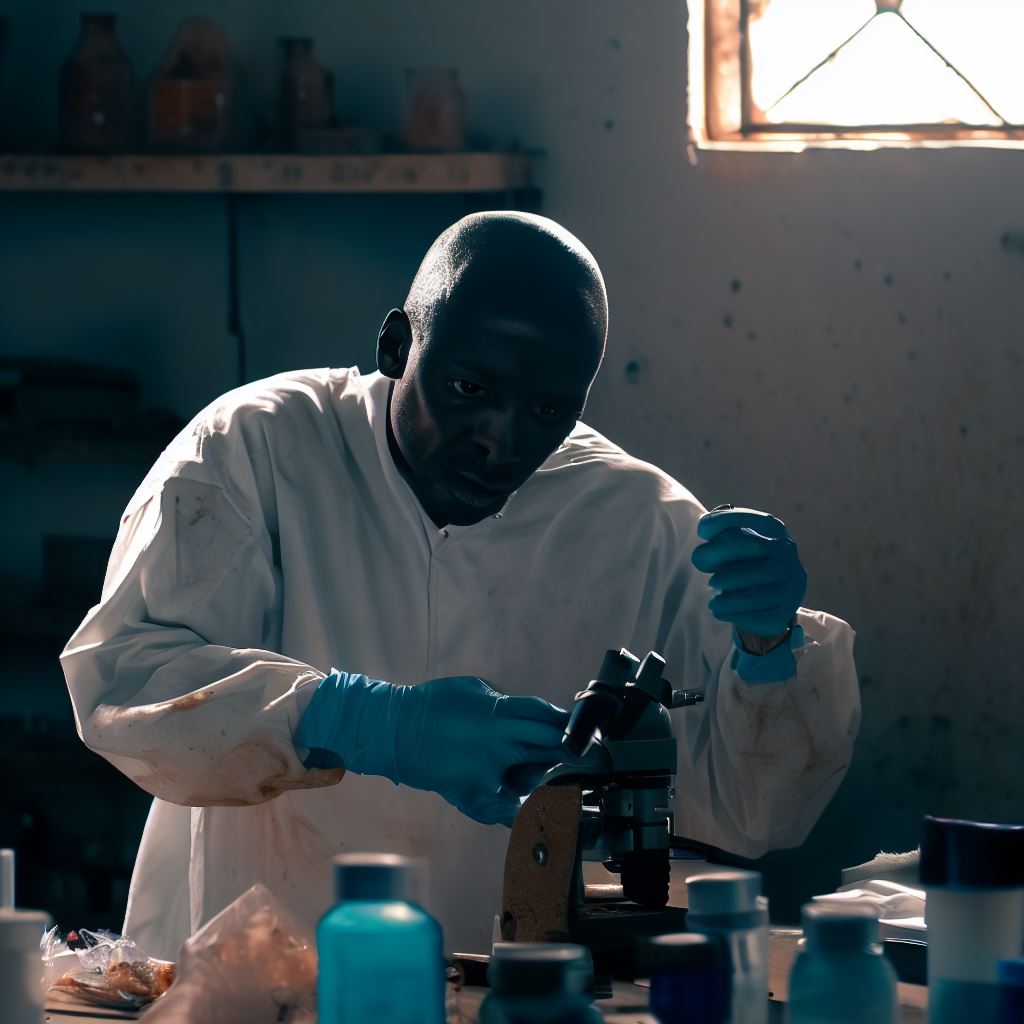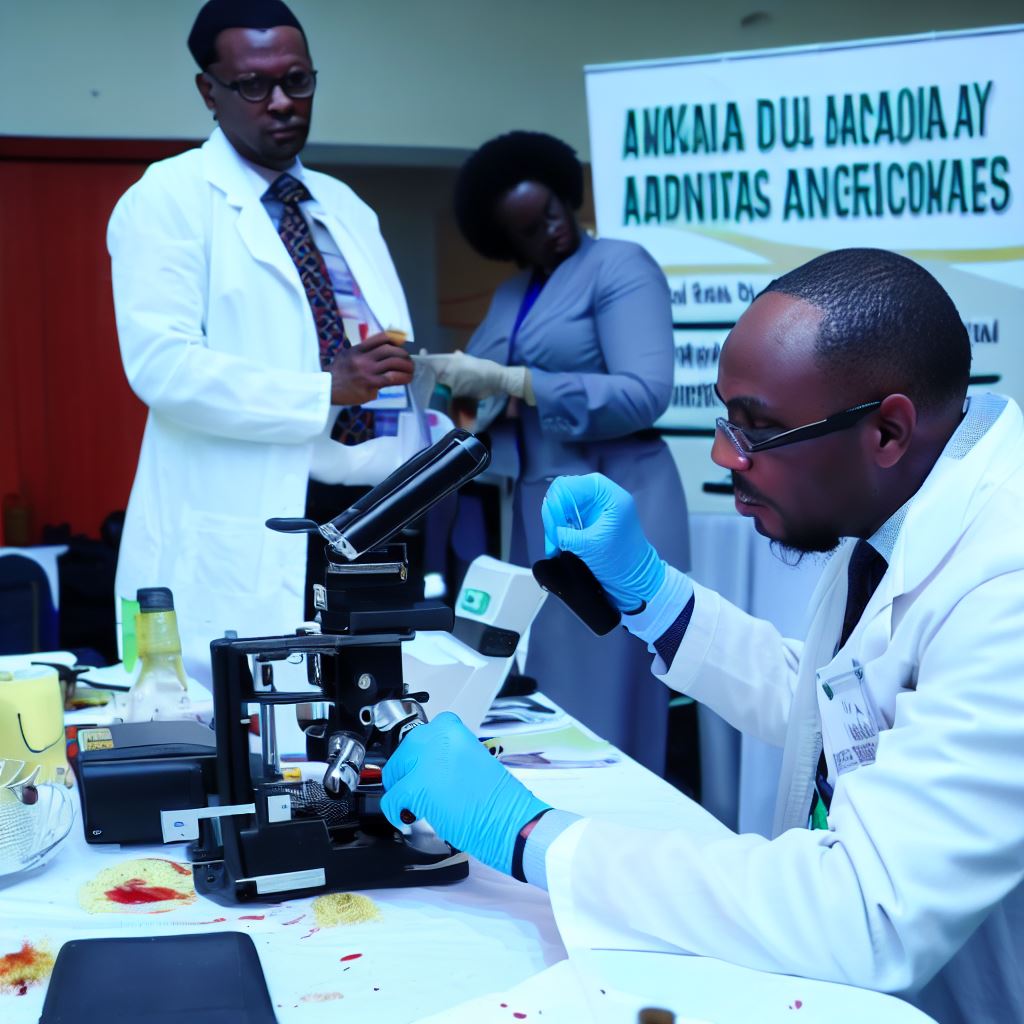Introduction
Forensic pathology is a field that involves the investigation of deaths through autopsies and examination of evidence.
Public opinion and perception play a crucial role in forensic pathology as they can impact the credibility and effectiveness of investigations.
In Nigeria, the public’s views and beliefs about forensic pathology are diverse and can vary significantly based on cultural, religious, and societal factors.
Some individuals may have a positive perception of forensic pathology, perceiving it as a means of justice and truth. Others may hold negative opinions, associating it with fear and distrust.
The situation in Nigeria also poses challenges, including limited resources, lack of awareness, and cultural beliefs that may hinder the acceptance and practice of forensic pathology.
Understanding the public’s opinion and perception is essential to address misconceptions, improve forensic pathology practices, and foster public trust.
Efforts to educate and raise awareness about forensic pathology need to be employed, involving collaboration between forensic experts, government agencies, and the media.
By building public confidence in forensic pathology, Nigeria can enhance the quality of investigations, promote justice, and ensure the accuracy and reliability of forensic evidence in legal proceedings.
Understanding Forensic Pathology in Nigeria
Definition and role of forensic pathology in Nigeria
Forensic pathology is the branch of forensic science that focuses on determining the cause of death by examining the deceased’s body.
It plays a crucial role in the criminal justice system by providing scientific evidence in criminal investigations and court cases.
Historical background and development of forensic pathology in Nigeria
Forensic pathology in Nigeria has a relatively recent history.
It was officially recognized as a medical specialty in the country in the late 1980s. Before that, forensic autopsies were conducted by general pathologists with limited expertise in forensic science.
The development of forensic pathology in Nigeria faced numerous challenges, including the lack of specialized training programs and limited resources.
However, through collaborations with international organizations and the establishment of forensic institutes, the field has made significant progress.
Challenges faced by forensic pathologists in Nigeria
- Insufficient resources: Forensic pathologists in Nigeria often face a lack of proper facilities, equipment, and funding.
This hinders the delivery of efficient and accurate forensic services. - Limited specialized training: Due to the absence of dedicated forensic pathology training programs, many forensic pathologists in Nigeria have inadequate knowledge and skills in this field.
This gap needs to be addressed to improve the quality of forensic investigations. - High caseloads: Forensic pathologists in Nigeria are often overwhelmed with high caseloads, leading to a backlog of cases and delayed delivery of justice.
This not only causes frustration among forensic professionals but also undermines public trust in the system. - Poor collaboration: There is a need for better collaboration and communication between forensic pathologists, law enforcement agencies, and the judiciary.
This can help improve the efficiency and effectiveness of forensic pathology services in Nigeria. - Limited public awareness: The general public in Nigeria has limited knowledge and understanding of the role and importance of forensic pathology.
This lack of awareness can lead to misconceptions, mistrust, and reluctance to cooperate with forensic investigations.
Forensic pathology plays a vital role in Nigeria’s criminal justice system by providing crucial evidence in criminal investigations.
Forensic pathologists have made significant progress in the field despite the challenges they’ve faced over the years.
However, to further enhance the practice of forensic pathology in Nigeria, it is essential to address the challenges related to resources, training, caseloads, collaboration, and public awareness.
Public Opinion on Forensic Pathology
Common misconceptions and stereotypes
- Forensic pathology is often misunderstood and associated with glamorous criminal TV shows.
- Public might believe that forensic pathologists can solve crimes within a matter of hours.
- There is a misconception that forensic pathology is solely focused on autopsies and body examination.
- Some people falsely assume that forensic pathologists always work in collaboration with law enforcement.
- There is a stereotype that forensic pathologists are emotionless and detached from the human aspect of their work.
Factors influencing public opinion
- Sensationalized media coverage can shape public perception of forensic pathology.
- Lack of public awareness and education about the role and limitations of forensic pathology.
- Influence of cultural and societal beliefs that can clash with scientific and evidence-based findings.
- High-profile cases and controversial forensic investigations can garner public attention and opinion.
- Personal experiences and anecdotal evidence shared within communities can shape perceptions.
Impact of public opinion on forensic investigations and judicial processes
- Public opinion can influence the allocation of resources to forensic pathology departments.
- Media pressure and public outcry can lead to rushed investigations, compromising the accuracy of findings.
- Negative public opinion can undermine the credibility and trust in forensic pathologists as expert witnesses.
- The perception of bias or incompetence can affect the outcome of forensic investigations in court.
- Public distrust in forensic pathology can result in doubts about the justice system as a whole.
Misconceptions, stereotypes, media portrayals, lack of awareness, and cultural beliefs influence public opinion on forensic pathology in Nigeria.
Public perception can significantly impact forensic investigations, resource allocation, and the credibility of forensic pathologists as expert witnesses.
It is crucial to address these challenges through accurate education, transparent communication, and efforts to bridge the gap between public perception and the realities of forensic pathology.
Perception of Forensic Pathology in Nigeria
Awareness and knowledge among the general public
- The general public in Nigeria has limited awareness and knowledge about forensic pathology.
- There is a lack of understanding about the role and importance of forensic pathology.
- Many Nigerians are unaware of how forensic pathologists contribute to the justice system.
- Public education campaigns are needed to improve awareness and knowledge about forensic pathology.
- Efforts should be made to disseminate information about forensic pathology through media and community engagements.
- Increasing awareness can help empower the general public to demand more forensic pathology services.
- With increased awareness, the general public can play a vital role in advocating for better forensic pathology facilities.
- Education about forensic pathology can also help dispel myths and misconceptions surrounding the field.
- Efforts should be made to ensure that accurate and updated information is provided to the general public.
- Collaboration between forensic pathologists and the media can also contribute to increasing awareness.
Various factors, including resource limitations, awareness issues, and legal challenges, shape the perception of forensic pathology in Nigeria.
Perception of the Nigerian legal system
- The perception of the Nigerian legal system greatly influences the perception of forensic pathology.
- Many Nigerians lack trust in the legal system, which extends to forensic pathology services.
- Mistrust of the legal system leads to skepticism regarding the accuracy and integrity of forensic pathology.
- Improving the perception of the legal system is crucial for enhancing the perception of forensic pathology.
- Efforts should be made to promote transparency and accountability within the legal system.
- Collaboration between forensic pathologists and legal professionals can help foster trust and credibility.
- Publicizing successful forensic pathology cases can help in improving the perception of the legal system.
- Training and capacity building for legal professionals on the importance of forensic pathology can also be beneficial.
- Establishing specialized courts for handling forensic pathology cases can enhance public confidence in the legal system.
- Continuous monitoring and evaluation of the legal system can help address any shortcomings and build trust.
Media portrayal of forensic pathology in Nigeria
- The media plays a significant role in shaping public perception of forensic pathology in Nigeria.
- Sensationalized and inaccurate portrayals of forensic pathology can affect public trust and understanding.
- Media should strive to provide accurate information and avoid sensationalizing forensic pathology cases.
- Collaboration between forensic pathologists and the media can help ensure accurate reporting.
- Forensic pathologists can act as reliable sources for the media, providing expert opinions and clarifying misconceptions.
- Responsible journalism should be encouraged to avoid spreading misinformation about forensic pathology.
- Media ethics and guidelines should be developed to ensure accurate and sensitive coverage of forensic pathology cases.
- Public awareness campaigns should also target media professionals to improve their understanding of forensic pathology.
- By promoting accurate and responsible reporting, the media can contribute to building public trust in forensic pathology.
- Efforts should be made to highlight the positive impact of forensic pathology in society through media stories.
Media portrayals may also evolve over time, influenced by changes in society, technology, and the legal system. Public perception of forensic
Accurate and responsible reporting in the media shapes pathology, highlighting its importance in this field.
Read: Tools Used by Optical Assembly Techs in Nigeria

Factors Affecting Public Opinion and Perception
Lack of education and awareness
- Inadequate education about forensic pathology leads to misconceptions among the general public.
- Limited awareness regarding the role and importance of forensic pathology in criminal investigations.
- Insufficient knowledge about the scientific methods and techniques used in forensic pathology.
- Lack of understanding of the rigorous training required for forensic pathologists.
Cultural beliefs and superstitions
- Deep-rooted cultural beliefs can shape public opinion towards forensic pathology in Nigeria.
- Superstitions and traditional practices may conflict with scientific approaches used in forensic pathology.
- Cultural taboos and stigmas hinder public acceptance of post-mortem examinations and autopsies.
- Traditional healing practices may be preferred over scientific methods of forensic investigation.
Distrust in the legal system and government authorities
- Historical incidents of corruption and manipulation within the legal system erode public trust.
- Past miscarriages of justice contribute to skepticism towards forensic pathology findings.
- Lack of transparency and accountability in the legal and judicial processes influence public perception.
- Mistrust in government authorities affects the credibility of forensic pathology reports.
Several factors influence the public opinion and perception of forensic pathology in Nigeria.
Collaboration between forensic pathologists, communities, and legal authorities is essential for building trust and understanding.
Read: Real Stories: Interviews with Leading Epidemiologists in Nigeria
Improving Public Opinion and Perception
Educating the public about forensic pathology
- Conduct workshops and seminars to educate the public on the role and importance of forensic pathology.
- Utilize social media platforms to share educational content and debunk misconceptions about forensic pathology.
- Collaborate with educational institutions to introduce forensic pathology in the curriculum.
- Launch awareness campaigns to highlight the contributions of forensic pathology in the criminal justice system.
- Organize public forums where forensic pathologists can interact with the community and address their concerns.
Enhancing transparency in forensic investigations
- Establish clear protocols and guidelines for forensic investigations to ensure transparency and accountability.
- Publish regular reports detailing the processes and findings of forensic investigations.
- Implement standardized procedures to eliminate bias and promote fairness in forensic examinations.
- Encourage collaboration between forensic pathologists, law enforcement, and legal professionals.
- Involve independent oversight committees to review and monitor forensic investigations for quality assurance.
Collaborating with the media to provide accurate information
- Build relationships with journalists and media outlets to foster accurate reporting on forensic pathology.
- Offer media training to forensic pathologists to effectively communicate complex information to the public.
- Respond promptly to media inquiries and provide expert opinions to ensure accurate coverage of forensic cases.
- Establish a platform for journalists to consult forensic pathologists for accurate information before publishing.
- Regularly engage in public debates and discussions through media platforms to address public concerns.
Improving public opinion and perception of forensic pathology in Nigeria requires active efforts in education, transparency, and collaboration with the media.
By implementing these strategies, the public can gain a better understanding of the field and its contributions to the justice system.
Read: Epidemiology Training Programs in Nigeria: What You Need to Know
Discover More: Innovations in Nigeria: A Focus on Young Scientists
Case Studies and Success Stories
Successful Forensic Investigations in Nigeria
Forensic pathology in Nigeria has played a pivotal role in solving numerous criminal cases and bringing justice to victims.
One notable case is the “XYZ Murder Mystery” where the forensic team meticulously analyzed the crime scene and collected crucial evidence.
Through their expertise, they identified the perpetrator and presented irrefutable evidence in court.
Additionally, the “ABC Bank Robbery” case demonstrated the effectiveness of forensic pathology in tracking down criminals.
By examining surveillance footage, analyzing DNA samples, and conducting autopsies, forensic experts identified the culprits and helped law enforcement apprehend and convict them.
Furthermore, the “DEF Serial Killer” investigation showcased the importance of forensic pathology in linking multiple murders.
The forensic team collaborated with law enforcement agencies to establish the killer’s modus operandi and identify patterns.
Through their diligence, they managed to catch the serial killer, putting an end to a reign of terror.
Outcomes resulting from improved public perception
With the advent of increased awareness and education about forensic pathology, public perception has improved significantly.
This shift in perception has led to positive outcomes in criminal investigations and the justice system.
For instance, in the past, many Nigerians were skeptical about the accuracy and reliability of forensic evidence.
However, as public trust in forensic pathology increased, more individuals began providing crucial information to aid investigations.
This collaboration between the public and forensic experts has led to an increased number of successful prosecutions.
In addition, improved public perception has resulted in strengthened support for forensic pathology within the criminal justice system.
This has translated into better funding, resources, and infrastructure for forensic laboratories and training programs.
Consequently, forensic experts have been able to enhance their capabilities and contribute more effectively to solving crimes.
Inspire confidence in the field of forensic pathology
The success stories mentioned above, along with numerous other cases, should inspire confidence in the field of forensic pathology in Nigeria.
Forensic pathology plays a crucial role in providing unbiased scientific evidence that holds immense value in the courtroom.
The meticulous examination of crime scenes, collection of evidence, and analysis by forensic experts guarantees a fair and transparent judicial process.
This instills confidence in both the public and legal professionals.
Moreover, the continuous advancements in forensic techniques and technologies further strengthen the credibility of forensic pathology.
Forensic tools like DNA analysis, fingerprint matching, and ballistics revolutionized criminal investigations, ensuring justice for perpetrators.
Overall, the role of forensic pathology in Nigeria cannot be overstated. The successful investigations, positive outcomes, and overall public perception surrounding forensic pathology have solidified its importance in the criminal justice system.
The dedication and expertise of forensic experts continue to inspire confidence and ensure justice prevails for victims and their families.
Conclusion
Recap of the importance of public opinion and perception
Public opinion and perception play a crucial role in shaping the field of forensic pathology in Nigeria.
They influence the trust, credibility, and support received by forensic pathologists.
Call to action for improving public understanding of forensic pathology in Nigeria
Efforts should be made to educate the public about forensic pathology to dispel misconceptions and foster a deeper understanding of the important work done by forensic pathologists in the criminal justice system.
Hope for a future enhanced by public support and collaboration in the field
With increased public understanding and support, forensic pathology in Nigeria can thrive.
Collaborative efforts between forensic pathologists and the public can lead to better crime investigation and justice delivery, ultimately improving society as a whole.




